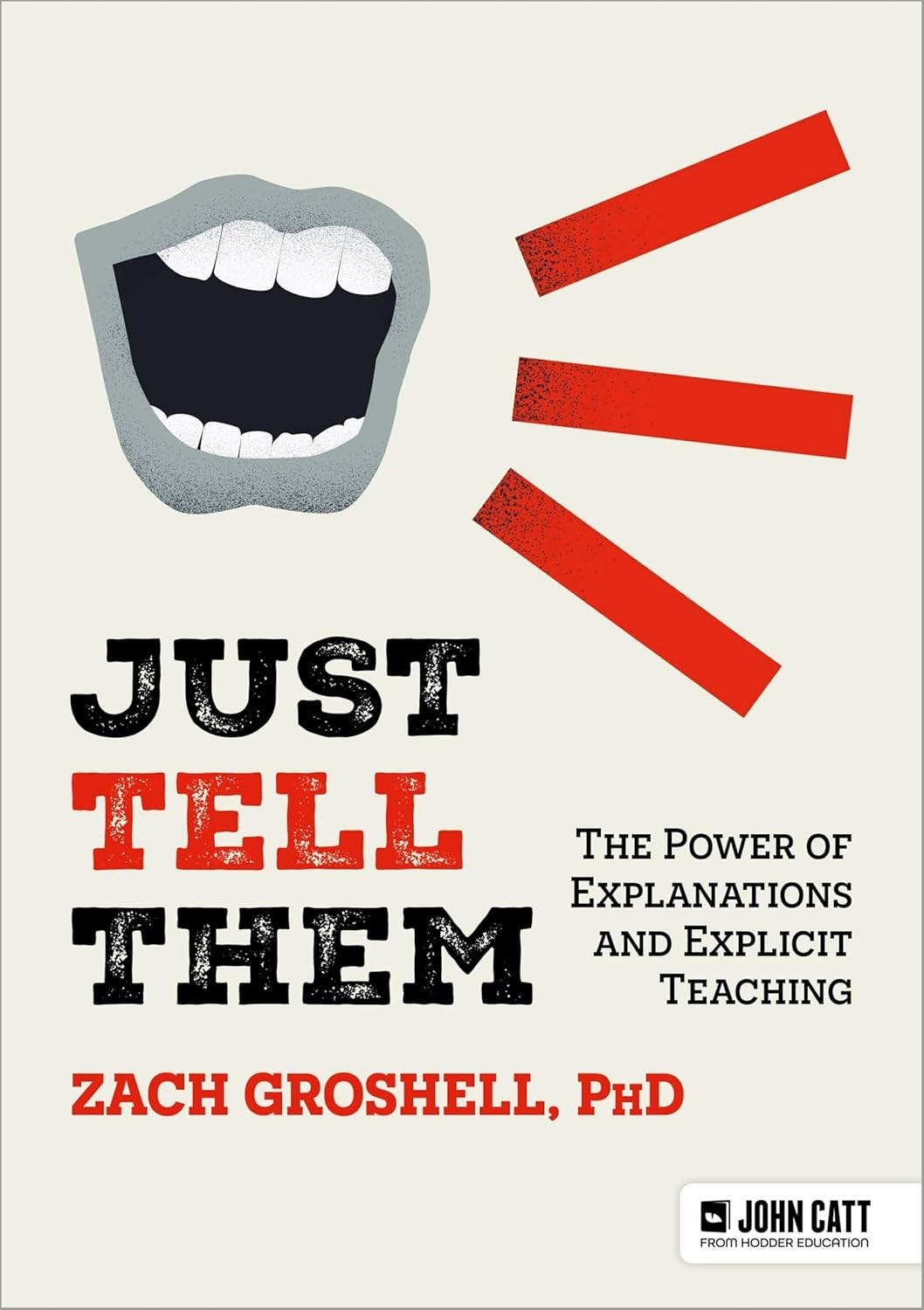This Book "Just Tells" Teachers About Explicit Instruction
Because "discovering" that on their own could take forever.
Before launching the reader into the “meat” of his book, the author, Zach Groshell, gives fair warning to educators who prefer the saccharine, yet ineffective, methods they learned in their education courses. “Just Tell Them” is the result of a teacher who, after years of trying the techniques he learned in his training, “came to realize that effective teaching is not about keeping information from kids, but about providing the information kids need to think about and getting them to think hard about it.” Anyone who decides this book isn’t for them after this word of caution misses out on the opportunity to teach better so students learn better.
In less than one hundred pages, Groshell clearly and concisely articulates explicit instruction's why, what, and how. In doing so, he demonstrates the efficiency of the method. He begins by explaining the “cognitive architecture” of students, highlighting working memory and long-term memory. When teachers understand the cognitive science behind learning, it will positively impact how they approach teaching.
Groshell provides examples and cautions that teachers can unintentionally leave students with cognitive overload rather than a clear understanding. He reflects on the “productive buzz” in his own classroom, which filled him with pride until he realized how many students were overwhelmed and confused by all the activity. His search for a better way to effectively teach all of his students led him from “inquiry-based” instruction to the more cognitive-friendly direct instruction approach.
One key element Groshell discusses is “teacher clarity.” For those of us who are quite fond of words, this can feel a bit convicting. However, understanding the extra load that “vagueness terms,” “discontinuity,” or “seductive details” place on students should motivate even the most passionate logophile. Clear, concise, and coherent statements lighten the cognitive load and help students learn better.
Groshell explains the benefits of breaking lessons into smaller chunks, providing plenty of opportunities for students to respond to questions in unison, and maintaining a “brisk pace” to keep students engaged. Some may question the last point, but as Groshell explains, “Lessons that lag are invitations for students to tune out our misbehave.” He addresses what to do when a teacher realizes some students require more instruction than others, but he argues that faster is usually better during whole-class instruction.
A healthy section of the book is devoted to the importance and proper use of visuals and examples. Groshell “takes a page” from his book and provides readers with clear, concise charts and examples of the various principles to consider when deciding which visuals to use at different stages of instruction. He even includes guidance on the appropriate use of PowerPoint presentations for those who have a love/hate relationship with them.
As Groshell concludes this very practical resource on explicit instruction discussing “fading guidance”, he clarifies the misconception that cognitive load is “about making learning as easy as possible”. Instead, he states it is about ensuring “the load is neither too high nor too low”. When teachers find the “sweet spot”, students will gain the knowledge they need to apply it to new concepts or ideas confidently. This allows teachers to remove some guardrails, enable students to make connections, and develop a “deeper understanding” of the inquiry-based methods that proponents are always touting.
This short, informative book is a must-read for every aspiring teacher mired in sentimental and idealistic “edu-speak. “It will likely debunk much of what they were taught in teacher training and lead to their (and their students’) success in the classroom. Veteran teachers will likely be affirmed and vindicated about what they already know to be true, so they should read it, too.





Ok, i live in Middletown too, near CAL, i can swing by on my way home from school. Tomorrow?
Do you have a copy of this book? I'd love to read it.